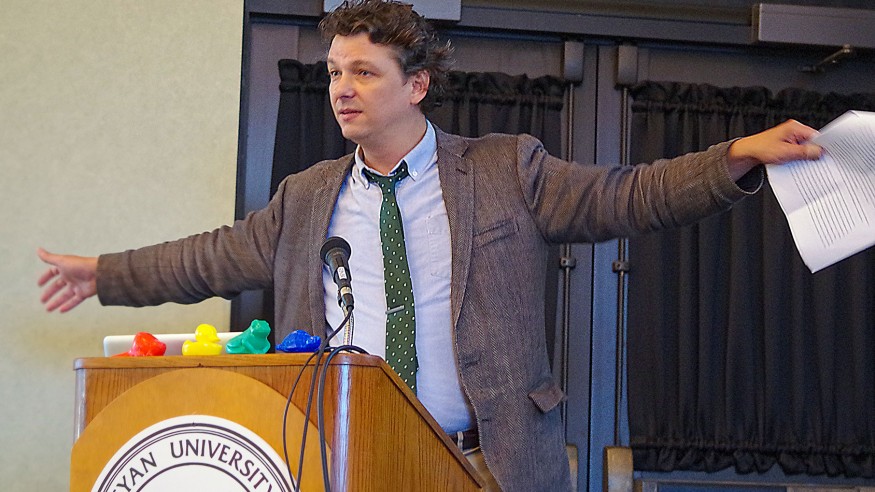A Whale of an Event
Donovan Hohn discusses his book, “Moby-Duck,” as part of Ohio Wesleyan’s 2014 Sagan National Colloquium. The ‘friendly floaties’ that inspired his work are on the podium in front of him. (Photo by Spenser Hickey ’15)
Author Donovan Hohn encouraged people to open their eyes and minds when he kicked off Ohio Wesleyan University’s 2014 Sagan National Colloquium, “H2OWU: Water in Our World.”
OWU students discuss environmental issues with Donovan Hohn during his Sept. 4 campus visit. (Photo by Spenser Hickey ’15)
Hohn was on campus Sept. 4 to discuss his book, “Moby-Duck: The True Story of 28,800 Bath Toys Lost at Sea and of the Beachcombers, Oceanographers, Environmentalists, and Fools, Including the Author, Who Went in Search of Them.”
The former teacher learned about the missing rubber ducks and other toys from a student essay discussing the incident. Like Captain Ahab, Hohn decided to track down the slippery beings. Unsurprisingly, Herman Melville’s “Moby-Dick” was a key source of inspiration for Hohn.
The “friendly floaties” Hohn was seeking were lost from a container ship in January 1992 and later began to wash up on beaches around the world.
During Hohn’s expedition, he met a nearly blind oceanographer and was intrigued that, as a result of her education and experience, she could “see” the ocean more clearly than he could in many ways.
The limits of the human eye were a repeated theme in his lecture, one he emphasized with photographs that audience members learned didn’t tell the complete story of what they were depicting.
As an example, he showed images of a dead albatross with a stomach full of plastic and of other birds sitting in a field of flowers. While plastic is bad, the larger danger to albatrosses comes from the invasive flowers that have cropped up in their nesting areas, Hohn said. The plants raise the ground temperature and take up water that can dehydrates the chicks and kill them.
Hohn was brought to campus and introduced by assistant professor of history Ellen Arnold, chair of this year’s 30th annual Sagan National Colloquium speaker series.
“The explorers and what and how they learn is a metaphor for liberal arts learning,” Arnold has said. “We start pulling threads until we see the bigger pictures. These journeys can take us to places we have never been.”
For more information on this year’s Colloquium, visit https://www.owu.edu/about/offices-services/academic-affairs/programs/sagan-national-colloquium/.

